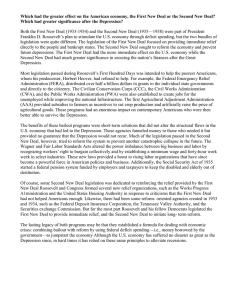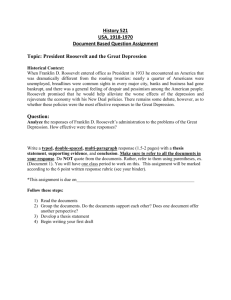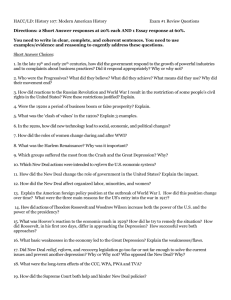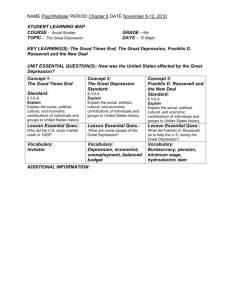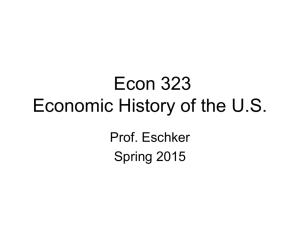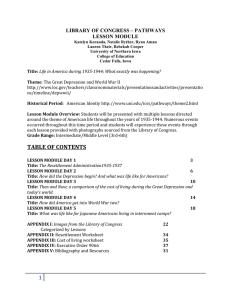Final Exam Review
advertisement
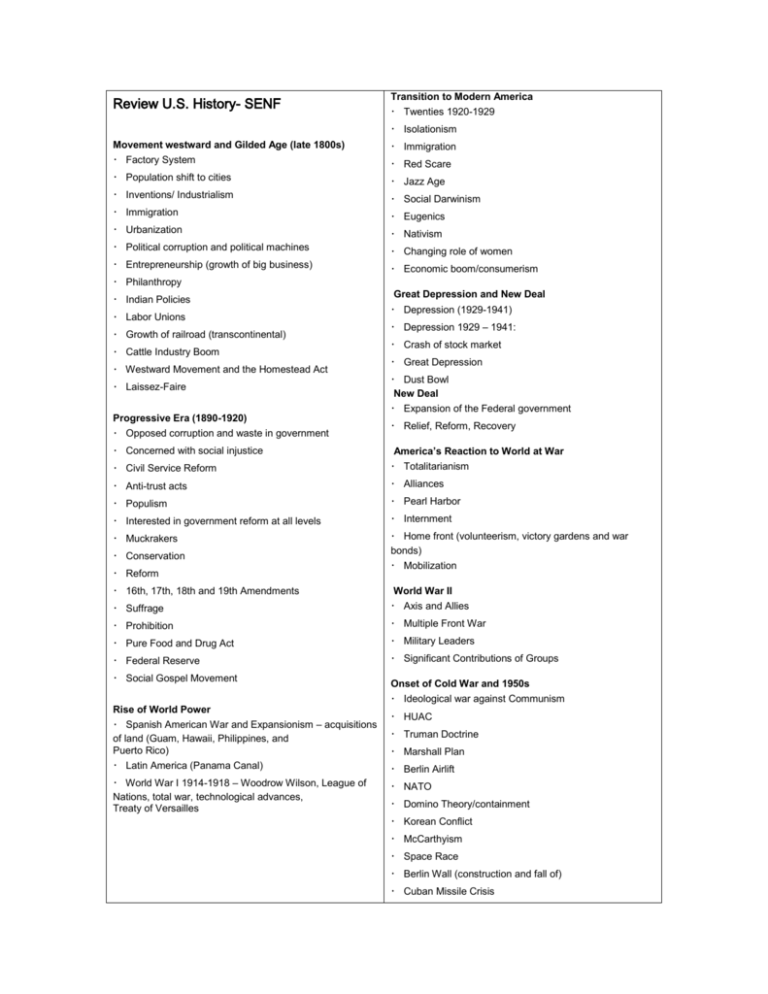
Review U.S. History- SENF Transition to Modern America Twenties 1920-1929 Isolationism Movement westward and Gilded Age (late 1800s) Factory System Immigration Red Scare Population shift to cities Jazz Age Inventions/ Industrialism Social Darwinism Immigration Eugenics Urbanization Nativism Political corruption and political machines Changing role of women Entrepreneurship (growth of big business) Economic boom/consumerism Philanthropy Indian Policies Labor Unions Growth of railroad (transcontinental) Cattle Industry Boom Westward Movement and the Homestead Act Laissez-Faire Great Depression and New Deal Depression (1929-1941) Depression 1929 – 1941: Crash of stock market Great Depression Dust Bowl New Deal Expansion of the Federal government Progressive Era (1890-1920) Opposed corruption and waste in government Concerned with social injustice Relief, Reform, Recovery America’s Reaction to World at War Civil Service Reform Totalitarianism Anti-trust acts Alliances Populism Pearl Harbor Interested in government reform at all levels Internment Muckrakers Conservation Reform 16th, 17th, 18th and 19th Amendments Suffrage Home front (volunteerism, victory gardens and war bonds) Mobilization World War II Axis and Allies Prohibition Multiple Front War Pure Food and Drug Act Military Leaders Federal Reserve Significant Contributions of Groups Social Gospel Movement Rise of World Power Spanish American War and Expansionism – acquisitions of land (Guam, Hawaii, Philippines, and Puerto Rico) Latin America (Panama Canal) World War I 1914-1918 – Woodrow Wilson, League of Nations, total war, technological advances, Treaty of Versailles Onset of Cold War and 1950s Ideological war against Communism HUAC Truman Doctrine Marshall Plan Berlin Airlift NATO Domino Theory/containment Korean Conflict McCarthyism Space Race Berlin Wall (construction and fall of) Cuban Missile Crisis Important Dates Civil Rights Movement Political Organizations Civil Rights Acts (1957 and 1964) Voting Rights Act of 1965 Various Approaches to advocacy Significant Supreme Court Cases Presidential Actions and Congressional Votes Significant Leaders New Frontiers and Familiar Enemies New Frontier – John F. Kennedy Great Society – Lyndon B. Johnson 1898 – Spanish-American War 1914-1918 – World War I 1929 – Stock Market Crash, Beginning of the Great Depression 1939-1945 – World War II 1957 – Sputnik: Beginning of the U.S-Soviet Space Race 1968-1969 – Martin Luther King Jr. assassination and U.S. lands on the moon 1991 – Cold War ends 2001 – terrorist attacks on World Trade Center and the Pentagon 2008 – election of first black president, Barack Obama Vietnam War 1970-1990 Nixon and relationship with China Reaganomics Peace through Strength Involvement in the Middle East Conservative Resurgence 1990- present U.S. Involvement in World Affairs Persian Gulf War Balkan Crisis September 11, 2001 Long term effects of government programs 2008 Presidential Election CONSTITUTIONAL ISSUES RAISED BY FEDERAL GOVERNMENT POLICY CHANGES DURING TIMES OF SIGNIFICANT EVENTS WW I – soon after declaring war on Germany and its allies in 1917, Congress ruled that the U.S. mail could not be used for sending any material urging "treason, insurrection or forcible resistance to any law." It punished offenders with a fine of up to $5,000 and a five-year prison term. Great Depression – Roosevelt’s attempt to increase the number of Supreme Court justices from 9 to 13 would have created a shift in the “separation of powers” and “checks and balances”. WW II – soon after the bombing of Pearl Harbor, President Roosevelt signed Executive Order 9066, which authorized the military to remove JapaneseAmericans from America's West Coast and into internment camps. 1960s – the debate regarding the Gulf of Tonkin incident caused the creation of the War Powers Act, which placed restrictions on the executive branch’s ability to send American troops into combat. 9/11 – Patriot Act (Uniting and Strengthening America by Providing Appropriate Tools Required to Intercept and Obstruct Terrorism), purpose of the USA PATRIOT Act is to deter and punish terrorist acts in the United States and around the world, to enhance law enforcement investigatory tools, and other purposes.

